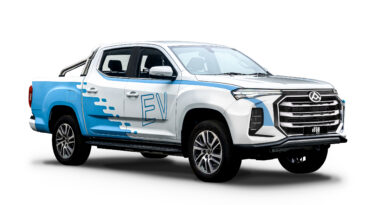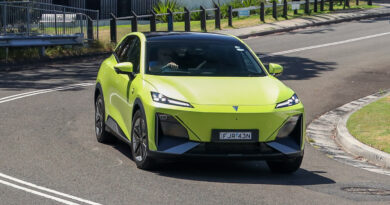2025 GWM Cannon Alpha PHEV Review: Why the first rival for the BYD Shark 6 is a real threat and a true alternative
The battle for the electrified ute dollar is heating up with the arrival of the GWM Cannon Alpha PHEV.
The newly arrived version of GWM’s largest ute now comes with a plug-in hybrid drivetrain that can run purely on electricity but with the backup of a petrol engine for added thrust and long distance touring.
The Cannon Alpha PHEV clearly has the BYD Shark 6 in its crosshairs.
However, GWM reckons it has the Shark covered with an electrified ute that can do almost anything traditional diesel utes can – and some things they can’t. With a 3.5-tonne towing capacity and dual-range four-wheel drive system, the Cannon Alpha is ready to go where no Shark has been before.
READ MORE: Ute wars! GWM Cannon Alpha targets BYD Shark 6 with 3.5-tonne towing
READ MORE: Has the BYD Shark 6 already been dethroned? Ahead of April arrival, GWM Cannon Alpha PHEV claims better towing and off-road numbers
READ MORE: Shark hunter: Plug-in Nissan Frontier Pro unwrapped in Shanghai to rival BYD Shark 6, Ford Ranger and GWM Cannon Alpha PHEV
READ MORE: Global debut: Chinese PHEV ute avalanche continues with MG U9 dual cab 4×4 rival for BYD Shark 6, GWM Cannon Alpha and Ford Ranger PHEV
READ MORE: Look out BYD Shark 6 and GWM Cannon Alpha! Ford Ranger PHEV pricing and specifications announced
And its rechargeable hybrid system makes it a tantalising alternative to a diesel Ford Ranger or Toyota Hilux. Of course, the Ranger PHEV arrives soon to make this a three-cornered electrified ute fight.

So, is the Cannon Alpha a PHEV saviour that could further shake up the ute establishment?
2025 GWM Cannon Alpha PHEV price and equipment
The GWM Cannon Alpha PHEV is priced from $56,990 plus on-road costs for the Lux model.
For that you get faux leather trim, power adjustable front seats, a 360-degree camera, a digital instrument cluster and a 14.6-inch central infotainment screen with wireless Apple CarPlay and Android Auto.
As well as PHEV badges there are also red brake callipers to differentiate it from the regular Alphas. Some fake wood and silver finishes inside make for a classy cabin given the pricepoint.

Plus there’s a full-size spare wheel, although it’s awkwardly bolted into the load area, soaking up space that could be used for other utey things. It’s there rather than under the floor because the high-voltage battery swallows up too much space.
There’s also the Ultra ($66,990 plus ORcs) that adds a panoramic sunroof, heated steering wheel, ventilated front seats, heated and ventilated outboard rear seats, ambient lighting, wireless phone charging, some real leather and a 10-speaker Infinity sound system.
That makes it $4000 more expensive than the regular hybrid that continues in Ultra guise.
But the petrol-electric drivetrain is the real appeal of the Cannon Alpha PHEV.
A 2.0-litre four-cylinder turbo petrol engine provides the pulling power foundation.

It runs through a traditional automatic transmission (in this case a nine-speed).
There’s also a dual-range transfer case (something missing in the Shark 6).
That allows for torque multiplication at lower speeds for heavy duty off-road work.

Throw in a locking rear and centre differentials (the Ultra also gets a locking front diff) and the Cannon Alpha has the hardware for some serious off-road work.
2025 GWM Cannon Alpha PHEV: What we think
The drivetrain is the big differentiator with the GWM Cannon Alpha so it seems like a good place to kick off.
The 2.0-litre four-cylinder turbo makes 180kW and 380Nm. They’re solid numbers against diesel utes that tend to hover around 150kW/500Nm.

But that petrol engine is in many instances the side show for the Cannon Alpha.
An electric motor sandwiched between the engine and gearbox adds 120W and 400Nm.
All up GWM claims a combined 300kW and 750Nm, which trounces everything except the Shark 6 in ute class.
Drive it in EV mode and there’s thoroughly respectable response from the electric motor.
A 37.1kWh battery is claimed to provide up to 115km of EV driving.

We found something like 80km to be more realistic and the range predictor that is part of the trip computer was often optimistic; a decent hill or some spirited driving could quickly knock 10-15km from its estimate.
Performance is decent, though. The torque, in particular, makes it a useful machine for driving nearly silently around town.
By EV standards it’s not very efficient. During our time we found it using 35-40kWh per 100km, around double what a smaller electric car might use.
If you’re paying 35 cents per kilowatt-hour for electricity then it’ll cost close to $14 to travel 100km.

That’s still less than you’ll spend keeping a diesel ute running around town.
And if you have solar or an EV electricity plan (you should!) then you could slash that to $5 or less.
On a road trip, charging from fast chargers makes a lot less sense. That cost could increase to $28 per 100km due to the higher cost of electricity from ultra rapid charging stations.
You’d be better off running on petrol, although even then we found it was relatively thirsty.
On a 400km country drive that reverted to hybrid mode once the battery had drained we were using about 12.5L/100km.
But there’s also a Smart or Intelligent mode (depending on what readout you’re looking at) that aims to maximise efficiency.
Essentially it keeps more charge in the battery and uses it when the onboard computer decides it makes most sense.
For long trips that is the mode to pick. We found it used less fuel. Our fuel use was more like 9.5L/100km for the return journey.

Good, but only roughly matching diesel utes.
Again, it’s the EV-only running around town that makes the most sense for the Cannon Alpha.
The Cannon Alpha PHEV also has a vehicle-to-load function as part of an optional ($230) adapter that plugs into the charge port. You’ve got to delve into the centre screen to get the electricity flowing, but once you do it’ll keep regular household appliances powered.
Performance wise, too, the Cannon Alpha is a winner. There are occasional inconsistencies to its power delivery, but there’s no denying its thrust.
At 2.8 tonnes it’s about 230kg heavier than the regular hybrid. It is a heavy ute.
So that tempers its enthusiasm slightly, but there’s still more than you’ll get in a Toyota Hilux or Ford Ranger.
We also towed a circa-2.8-tonne trailer with the Cannon Alpha and can confidently say it does it with little fuss.
Acceleration is solid and it’ll comfortably cruise at 100km/h.

With coil springs all around the Cannon Alpha is also well behaved by ute standards.
There’s some clumsiness to its cornering (blame that partly on the heft) but it’s generally decent.
But it’s off-road where GWM reckons the Cannon Alpha PHEV will be a big winner.
In short, it’s designed for heavy duty off-road work (the Shark 6 isn’t).

We tested it over some basic obstacles and it was impressively capable.
Good wheel articulation means there’s a better chance of having the tyres in touch with terra firma.
And while there’s the occasional clunk from the drivetrain it does a good job of keeping the wheels moving.
Lock up the front and rear diffs (we drove the Ultra) and there’s supreme traction.
Ground clearance is also great, making for a very capable ute in rough terrain.

Elsewhere, there’s plenty of old school ute in the Alpha.
It’s bigger than most utes and feels it. There’s generous sprawling space inside and a good layout.
The back seats also slide their bases forward, which increases the angle of the seat back. It’s a nifty set-up and helps cement it as one of the best utes for rear seat comfort.
The sooner GWM puts a volume dial in play for the sound system the better, because it’s a constant frustration having to revert to the steering wheel buttons.
Elsewhere the physical buttons are well placed and useful.
The load area is broad, but having the spare wheel sitting upright to one side could seriously limit things if you want to really load up. It’s a clunky solution, but a necessary one.

The split tailgate is an engineering marvel … mostly.
Press the button and it creates 60/40 swing-out doors, making it easier to step into it and load a pallet.
Hold the button for longer and it folds down gently, like a regular ute.
We had some issues with the button sticking, which required some additional presses to get it moving again.
2025 GWM Cannon Alpha PHEV: Verdict
So, is the GWM Cannon Alpha PHEV better than the BYD Shark 6?
It depends how you’ll drive it.
If you’re planning to tow heavy loads regularly then it’s a no-brainer. The Cannon Alpha tows confidently and has one tonne more capability than the Shark.

Off-road, too, the Cannon Alpha is a winner. It’s clearly a very capable ute and one that will confidently tackle tricky terrain.
But it partly comes at the expense of its on-road nous.
The Cannon Alpha isn’t sharp dynamically and it can be thirsty when in hybrid mode.

It’s the sort of ute that needs to be recharged regularly (ideally at home on a cheap EV plan) to really take advantage of its electric offering.
Do that and you’ll be buying a well-credentialled ute that does everything many Aussies expect of a ute – with compromises along the way.
Score: 4/5
2025 GWM Cannon Alpha Ultra PHEV price and specifications
Price: $66,990 plus on-road costs
Basics: PHEV, 5 seats, 4 doors, ute, 4WD
EV range: 115km (NEDC)
Battery capacity: 37.1kWh
Battery warranty: 8 years/unlimited km
Energy consumption: 30.3kWh/100 claimed – 35-40kWh/100km on test
Fuel consumption: 1.7L/100km
Powertrain: 2.0-litre four-cylinder turbo-petrol, 180kW/380Nm
Motor: 1 in transmisssion, 120kW/400Nm
Combined output: 300kW/750Nm
AC charging: 7kW, Type 2 plug
DC charging: 50kW, CCS combo plug
0-100km/h: 6.9 seconds




